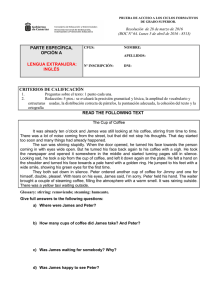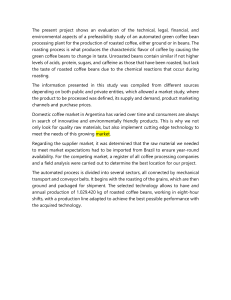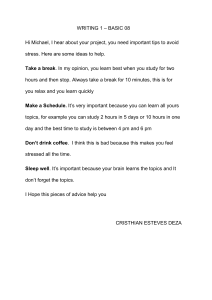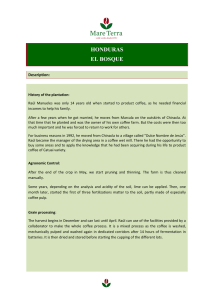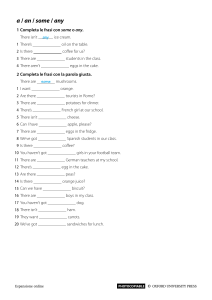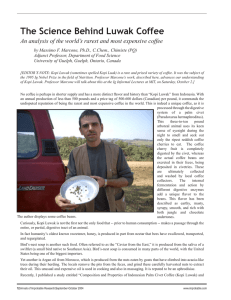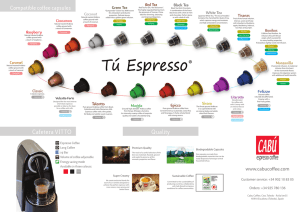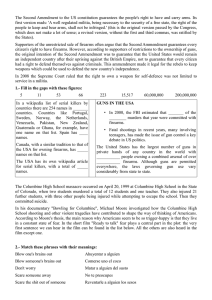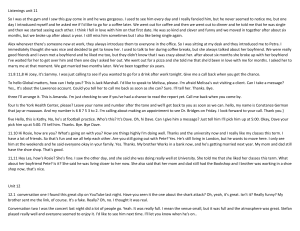Master-in-Coffee-Economics-and-Science-Didactic-program-1 (1)
Anuncio
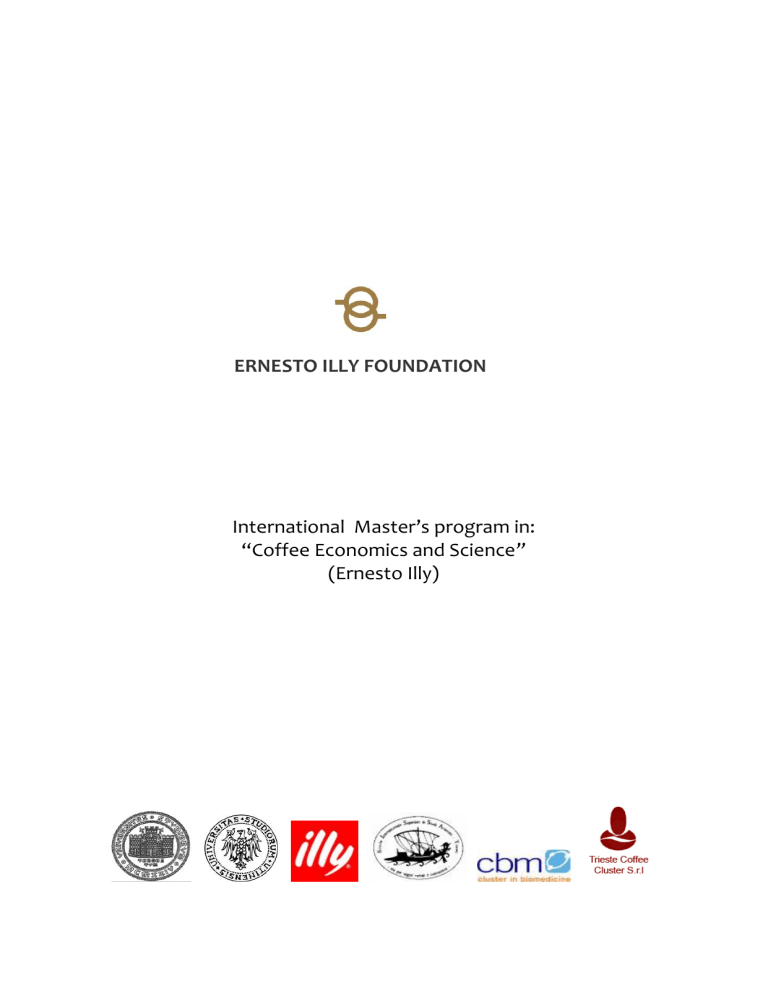
ERNESTO ILLY FOUNDATION International Master’s program in: “Coffee Economics and Science” (Ernesto Illy) Introduction on Masters in Coffee Economics and Science – Ernesto Illy Master’s degree in Coffee Economics and Science – Ernesto Illy is a university masters degree, organized and proposed by a renowned group of leaders in the field of education: the Ernesto Illy Foundation, illycaffè, the University of Trieste, University of Udine, International Superior School of Advanced Studies of Trieste (Sissa), the Association of Molecular Biomedicine and the District of coffee (Trieste Coffee Cluster). The master’s degree is composed of 400 hours of lessons divided into 12 educational modules and 60 formative university credits. The course work, to be given entirely in English, is open to graduates worldwide in Economics, Engineering, Sciences, Agriculture and similar disciplines. It embraces the entire productive cycle of coffee and it is developed in three disciplinary areas: economical-administrative, biologicalagronomic, and technological. The cost for this Master program is €15,000; however, the Ernesto Illy Foundation offers a limited number of scholarships available to worthy graduates, in particular to those who come from coffee producing countries. This 5-month program begins in mid-January and ends in mid-June. The months of mid-June until September are dedicated to the preparation of the thesis. Dissertations are held in the month of October (via web): the Program officially ends with the conclusion of the thesis defence. Master classes are held on the premises of illycaffè (Trieste, Italy). Its objective is to offer an in-depth multidisciplinary preparation to graduates interested in working in the world of coffee, and more generally, in the field of agro-alimentary -- in every stage of the productive cycle -- from the cultivation to the catering industry, including logistics and the industrial process. The program also aims to consolidate and develop relations between the regional Universities and the world of business by transferring the technological and cultural know-how of illycaffè, the moral and scientific legacies of Dr. Illy and the role of Trieste as the world’s most advanced city of coffee. For more information, write to [email protected] Presentation on Masters in Coffee Economics and Science The International Master in “Economics and Coffee Science” is devoted to post-graduate students coming from different faculties (Agriculture, Economics, Engineering and Science), who intend to acquire a specific professional training on the agronomical, technological and economical aspects of coffee science; in other words, from the coffee plant until the final product. Therefore, the proposal of this Master is to provide a broad knowledge that favours a multi-disciplinary approach. Nevertheless, the unifying criterion is the achievement of the best quality throughout all the production processes and the commercialization of the product: from crop production in the field, through sustainable agricultural practices, to the complete healthiness of the final product. For this reason, the Master must be, first of all, pervaded by an ethical principle based on the respect for man and environment. This Master is dedicated to post-graduate students interested in the production and commercialization of coffee and, in particular, to those coming from coffee-producing countries. Considering their heterogeneous academic and geographic origin, the courses will be preceded by lessons focused to fulfil the possible gaps in basic arguments (biology, agronomy, economics, etc.). The topics of this Master are subdivided in specific areas, such as biology-agronomy, technology, economics and management that, as a whole, allow to acquire a complete knowledge on the process and on the product. The Master on “Economics and Coffee Science” arises from an initiative of the Ernesto Illy Foundation and involves the Universities and research Institutes of the Italian region, Friuli Venezia Gulia. These Institutions possess the competence in coffee science and, in some cases, a long and consolidated tradition. This Master is explicitly inspired to the values, the scientific and managerial approaches that characterized the personality of Ernesto Illy, trying to collect his cultural heredity. Therefore, the dedication of this Master to such a great entrepreneur represents homage to his memory and an exhortation to continue along the path he had traced. INTERNAZIONALE MASTERS (FIRST LEVEL) PROGRAM (60 cfu) IN: “COFFEE ECONOMICS AND SCIENCE” (Ernesto Illy) Biological – Agronomic - Technological area: 27 CFU Coffee Botany and Physiology (3CFU) o Coffee Genetics (3CFU) o Genes and environment. Differentiation Arabica-Robusta. Self-fertility and selfsterility. The genome of Arabica. Varieties of Arabica and genetic diversity. Molecular methods for the traceability. Genetic base and bean quality. Coffee Cultivation and Climate Change (6CFU) o Systematic of Coffea genus. Morphological and anatomical characteristics of the coffee plant. Phenological stages of the coffee plant: germination, development, flowering, fruit development and maturation. General and environmental physiological aspects of the coffee plant. Classical propagation techniques and micropropagation techniques of the coffee plant. Secondary metabolites in coffee fruits: synthesis, accumulation and effects on human health. Biotic and abiotic degradation (pre- and post-coffee harvest). Physical-chemical properties of tropical soils. Tropical soil degradation. Effects of soil management on biological fertility and recycling of crop residues and organic wastes. Principles of the coffee plant mineral nutrition and plant responses to nutrient deficiency or toxicity. Fertilizer use and management. Action mechanisms, metabolic breakdown in plants and fate in the soil of the main pesticides. Weed control. Coffee plant protection: principles of integrated control. Insect and pest control. Fungi, bacteria and virus control. Physical, biological and geochemical processes responsible for and resulting from climate change. Climate Change Vulnerability and Adaptation. Land Use and the Carbon Cycle. Agricultural Water Management. Harvesting and raw coffee (3CFU) o Crop evaluation. Manual harvest. Mechanical harvest. Picking from the ground. Postharvest selection. Crop quality. Raw bean processing: dry, wet and semi-wet processing. Process influences on coffee quality. Cleaning and sorting processing. Storage, packaging, logistics and transportation of raw coffee. Raw bean defects and their origins. Coffee Industrial process (6CFU) o Preliminary operations: cleaning, hulling, grading and electronic sorting. Basic principles of heat and mass transport. Decaffeination process: methods and industrial machinery. Roasting process. Roasting methods, industrial roasting equipments. Grinding process. Chemical, physical and structural changes of grain. Packaging, chemical-physical changes during packaging, roasted product shelf-life. Other products: pods, capsule and ‘ready-to-drink’. Coffee Brewing & Characterization (6CFU) o Extraction methods: infusion and percolation. Chemical and physical characteristics of brewed coffee. Preparation methods and characterization: filter, moka, espresso. Brewing machines and main control parameters. Espresso definition. Other preparations. Physiology of perception, chemical senses: taste and olfaction. Cognitive processes. Introduction to sensory analysis. Sensory analysis typology and goals: filter coffee, espresso and moka cupping. Main chemical-physical methodologies of analysis to characterize coffee. Evaluations of different origins. Evaluation of raw coffee defects and off-flavours. Chemical characterization techniques: volatile, non-volatile compounds. An outline of regulation and food safety. Economics - management area: 30 CFU Green coffee markets and sustainable development (6 CFU) o World patterns in production and consumption. The ICA regulatory system. The post-ICA regime: from price controls to asymmetric free markets, oligopolies and price instability. Cost elasticity and transfer mechanism in coffee markets. International commodity markets. Coffee marketing boards and commodity market reforms. Quality and vulnerability of small scale farmers. Climate change and coffee production: the Ricardian approach. Fair trade and market failures. Specialties and terroir. Business ethics and Corporate social responsibility and the relationship with the supply chain. Sustainable coffee production in a pre-competitive manner. How to increase production, yields and export availability of sustainably grown coffee. How to implement standards to improve access to finance for farmers and mitigate the effects of climate change. The Supply Chain: International Sourcing and Quality management (6CFU) o The sourcing process, supplier evaluation and selection, buyer-supplier partnership, the organization of purchasing activities, centralization and decentralization of purchasing responsibilities. Supply network design and material management. Setting Quality Standards. ISO certification. Six Sigma. The Kano Model. The balanced scorecard. The Quality Function Deployment (QFD). Benchmarking. The Failure Mode and Effect Analysis (FMEA). Complex Systems Management and Innovative Business (3CFU) o Market consumption models and distribution channels (6CFU) o Geographical markets and purchasing/consumption habits. Consumption typologies of roasted coffee. The purchasing process and consumption experience. The factors influencing the purchasing/consumption process. Marketing management and marketing planning. Experiential marketing. Product decisions: global products and services; standardization versus adaptation; product features and perception; branding decisions in international markets. Pricing decisions. Direct and indirect distribution channels. Types of channel intermediaries; Retail and Ho.Re.Ca. channels (Hotel, Restaurant, Coffee bar and Catering channels); franchising; branded coffee shops and e-commerce. Competitive strategies in the coffee industry (6CFU) o Complex systems: main features. Complexity principles. Complexity principles applied to economics. Fundamentals of business dynamics. Fundamentals of agent based theory and simulation. Self-organization. Ecosystems as complex adaptive systems. Strategies in business ecosystems. Visual thinking fundamentals. Management applications of visual thinking. Case histories in food/coffee sector. Change drivers and PEST Analysis for the coffee industry. Industry analysis: a fiveforce approach. The role of complementary products. Competitive forces. Globalization drivers and internationalization processes. Industry consolidation and competitive dynamics in the coffee industry. Upwards and downwards integration: strategic implications. The conquest of the coffee consumer: competitive strategies in coffee. Coffee case histories. Trading techniques and risk management (3CFU) o The volatility of coffee prices, speculation and fundamentals in commodity markets. Forecasting techniques. Evaluating coffee price risk exposure. Price risk management in practice: standard futures and options in the coffee market, overthe-counter market and mixed products.

